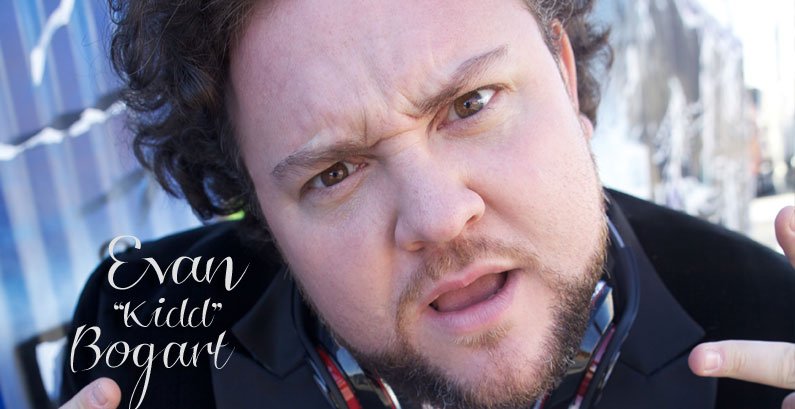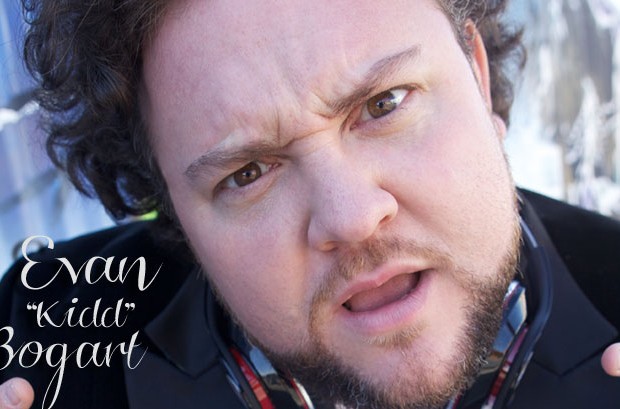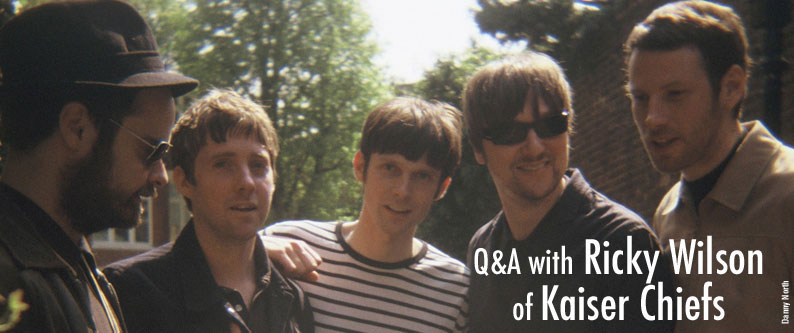
On the Hollywood set of the Boardwalk Entertainment series Majors & Minors, which pairs celebrity mentors like Avril Lavigne, Brandy, will.i.am, Adam Lambert, Colbie Caillat and Ryan Tedder with a group of 12 talented young singers, a fast moving crew of technicians readies the stage for the episode’s live performances. Soon the show’s executive co-producer Evan “Kidd” Bogart arrives for a lengthy day of taping. Boardwalk Entertainment, headed by Bogart, his brother Tim and television executive Gary A. Randall, is a multi-faceted entertainment group that includes Boardwalk Films, Boardwalk Television, Boardwalk Technologies and The Boardwalk Music Group. To call Bogart “busy” doesn’t even get close to the heart of the issue.
With recent cuts that include “Tonight, Tonight” for Hot Chelle Rae and “It Girl,” for Jason Derülo; “Children” by VV Brown featuring Chiddy Bang, and contributions to Universal/Motown act Days Difference, Evan Bogart is an A-list songwriter. The tune propelling Jennifer Lopez in the Fiat 500c commercial is titled “Until It Beats No More,” another Bogart co-write.
The son of music industry legend Neil Bogart, who founded legendary Casablanca Records, Evan’s rise through the music industry was rapid, perilous and he did it twice. Originally a rapper, he interned at Interscope Records as a teenager and later was on staff where he was instrumental in the signing of Eminem. Bogart evolved into a manager and then an agent, and in between nearly derailed his career with drugs and alcohol. In sobriety, he returned to the creative side as a co-writer of the smash “S.O.S.” for Rihanna along with producer Jonathan “J.R.” Rotem.
Bogart co-founded The Writing Camp, a hit songwriting, production, publishing and music supervision collective with Erika Nuri and DQ Quiñones, and his cuts have included songs by a wide roster of artists. In addition to the aforementioned artists, he has written for Pussycat Dolls, Leona Lewis, Britney Spears, Natasha Bedingfield, Ke$ha, Sean Kingston and Beyoncé––whose “Halo,” co-written by Bogart and Ryan Tedder, won the artist a Grammy Award. With the Boardwalk Entertainment Group, Bogart envisions a company whose multiple platforms will create opportunities for his artists and songwriters.
Music Connection: If we look at what you established with your partners in The Writing Camp and with what you are accomplishing at Boardwalk, we are reminded that songwriters have always done more than just write songs: From Johnny Mercer, a founder of Capitol Records to Leiber & Stoller and Gamble & Huff with their respective labels.
Evan Bogart: When I did a session with Kara DioGuardi, Ryan Tedder, Benny Blanco and Neon Hitch, Kara said to me, “Remember the days when we would wake up and the only thing we’d worry about was whether there was a Jamba Juice close to the studio?” I love what I do, how busy I am and all these different things, but there are days that I wake up and wish I could hang out until noon, go get a Jamba Juice, write a song, be done by six, go get dinner with some friends, then come home and watch TV.
MC: How do you relax?
Bogart: I treasure my Sundays during football season. I focus my energy on something completely different from music or my life. When I first started writing I was with J.R. Rotem. I was still at the agency when “S.O.S.” was a big hit. I found myself in the studio with Britney Spears and I quit the agency. I started writing every single day and I kept J.R.’s hours, which at the time were seven days a week, 18-hour days. I did that for the first year that I wrote. It was a grueling schedule.
MC: Is your writing schedule saner now?
Bogart: This past year I did the least amount of sessions I’d done since 2006, when I became a full-time songwriter. I had as many, if not more, cuts and more singles on the radio than ever. I think it’s because I gave myself time to live a life. I had more to write about, I had more fun doing it, and every time I’d step into the room to write a song I had to make it count, because now there are TV shows, artists and other writers to mentor. Everything has to be figured out beforehand. I can’t go in the room with anyone to just mess around anymore.
MC: When you first began writing was it to pre-existent tracks?
Bogart: There are certain levels of writing that are unspoken. When I started, I was writing with J.R. Rotem. Other than that, people would just send me beats. Getting in the room with other producers––even though I had a Number One already––wasn’t that easy. People saw me as J.R.’s guy. When I had offers to go in with other producers, there was a political thing to walk around. Then when I started branching out I was writing over beats. The next level is writing over a producer’s beats, then that producer brings you in to write over beats in the studio. But you don’t create together at first, especially in the pop world. Later you get to the point where you’re in with lower level artists with these producers or sometimes co-writing. And then artists take you around to their writers. You’re doing the hustle.
MC: How do you know when you’ve arrived?
Bogart: When you’ve got some cuts, people start calling you. Then when you’ve got hits, everyone is calling you. You get to the point where you can dictate what you want to do. I think I’ve gotten to that point.
I feel bad for writers and producers still pulling seven days, 18 hours a day. I see it on Twitter and Facebook. I want to shake them and say “The less you do the better you’ll write!”
MC: Your first TV series Platinum Hit on Bravo was a competition with upcoming songwriters, hosted by Jewel with Kara DioGuardi as the lead judge. You appear on camera as a mentor in Majors & Minors, which also focuses on younger artists and performers. Do you think kids are more talented these days?
Bogart: I bet kids aren’t more talented now, but because of YouTube and the Internet they’re more discovered. There might have been kids singing in church in the ‘80s and ‘90s in Wichita––they didn’t know what to do. They didn’t have the money to come to L.A., or the connections to try to make it. Now you have people getting signed off of YouTube videos.
MC: Boardwalk has a biopic, Spinning Gold, about your father, Neil Bogart, in pre-production. As the scion of a legendary executive, how did this determine the perception of your career?
Bogart: Growing up it was very difficult not to think that I was walking in somebody else’s life. I still run into that when someone says, “You’re just like your dad.” I appreciate that because he was amazing, but I want to be recognized for me. I think songwriting is what distinguished that. I own it now.
When I was younger I tried to run from it. My first internship at Interscope, it was such a new label that it was the only one my parents didn’t have connections with. I had a sense of entitlement, but it was really hard to have it at a place where no one gave a shit. There was no executive there to drag me into the office and tell me about the old days. And it was tough. There were days when I found myself crying in the kitchen.
MC: Was there ever a misconception that you had an easier time in the business because of your dad’s legacy?
Bogart: Yes. But not only is it not an advantage; it’s a disadvantage because people assume it’s an advantage. “He had it easy, that’s how he got into the industry.” First of all, my Dad’s been dead since 1982, okay? Everyone who did want to tell me stories about him wanted to tell me stories and then show me the door. It’s not like he’s alive.
They don’t owe him anything. So the kids from Ohio and Wichita who came to L.A. were looking at me like I was a music industry brat. And it’s not like the executives were giving me a leg up. I’ve never been given anything because of my dad.
MC: Never?
Bogart: I lied. I was given a great ear from him, for music and talent, and a marketing perspective inside of me that I was born with that was passed on genetically. I didn’t go to college. I went to “IRU”––Interscope Records University––from age 18 to 22 and this was fully paid for. For graduate school I studied artist management and booking, for which I was paid. Six years at Interscope, including the internship, four years in management, and two and a half at the agency. And I learned how to A&R and make a record, and to route a tour. Then I went out on my own.
MC: You have been very open in acknowledging the pitfalls of early success.
Bogart: I had the dark period of my life between management and the booking agency, where I got into drugs. But I pulled myself out. And in sobriety I became a songwriter, and I got reconnected with the creative talents that I had back in high school. I went back to the world once again to try to make it with literally a decade of schooling. By the time I was 22 years old, I had A&R’d Eminem and put together a Tupac album. These kids I’d grown up with who were graduating from USC Music Business School were asking me if I could get them jobs in the mailroom.
MC: You have three artists signed to Boardwalk: the Bay Area rapper-artist Wallpaper, a dirty blues/hip-hop singer-songwriter, ZZ Ward, and Sonyae Elise, who was the winner of Platinum Hit. How are their projects coming along?
Bogart: Wallpaper has sold 100,000 copies of his EP, and is now being signed to a major label deal. I’m A&R’ing and executive producing his record. We just closed a deal with L.A. Reid, so the release will be Boardwalk/Epic. ZZ Ward is Boardwalk/Hollywood Records. She’s a tough chick, but watching it happen for her…those moments are what keep me going and excite me. Sonyae is The Writing Camp/RCA. With the artists I sign, I don’t have to write with them. I don’t sign them for a “publishing grab.” ZZ has written 100 percent of her album. If I felt like it needed me, I would contribute, but I don’t.
MC: How much are you doing in the way of artist development and how much direction do you suggest?
Bogart: If you’re taking an artist who is unique and incredible and inspired, why would you want to go in there and fuck it up? What was awesome about my dad and was passed on to me is I don’t want to change what the artist is. I want to help them embellish it. Wallpaper is this funk, soul, rap, Bay Area thing that is out there and wacko. “Cool, you want to have three drummers in the band? Let’s do it. You want to wear a gold lame suit to the Video Music Awards? Then let’s find you a suit.”
MC: Talk to us about the team that you have around you, and what they do.
Bogart: No matter how hard I try I’m not the best at delegating. I come from “The best way to do things is do it yourself.” I’m picky. Larry Wade is involved in everything I do. He is the Executive Vice President of The Writing Camp, works on the business of my songwriting and Boardwalk. He is more like a consigliere––or as I call him my “Counsel Larry.” I’ve also been working with Advanced Alternative Media on the management side. With The Writing Camp, DQ and Erika are songwriters. Their own diverse talents, combined with Larry and Big Billy Clark, general manager of The Writing Camp, create the right business dynamic. The Writing Camp is a songwriting and mentorship publishing company.
MC: How does Boardwalk differ in its structure?
Bogart: Boardwalk is with my partners, my brother Tim and Gary A. Randall. Gary is the vet. He used to run Sony Entertainment and he put Melrose Place and Cagney and Lacy on the air; he ran Orion, and has been an independent producer. He is a co-producer of the series that he brought to us, The Glades. Tim comes from the TV world, but mostly the independent film world, and he looks at everything the independent way. My attorney, Matt Greenberg, is a soldier and a general: he has humongous clients who are bigger than me, but every day I feel like he’s working on our stuff.
MC: Last year was amazing for you in terms of cuts as a songwriter. Is there friction between your business side and your creative instincts?
Bogart: If I’m not writing songs, the castle falls. The friction works because at the end of the day there is a nucleus and it’s the creative. If I don’t have cuts; if I’m not continuously under pressure to deliver, everything else falls around it. It’s okay––that’s what I enjoy doing.
MC: What do you want to see happen?
Bogart: I want the world to fall in love with what I love. I want the Boardwalk empire off and running: TV shows, films, artists, publishing, songwriters, and maybe books.
If I can give anyone advice it would be on how to make it through their 20’s with drugs, alcohol and not fucking people over in the business. I believe that it is never too late to start again. It just takes time and dedication.
Contact The Courtney Barnes Group, 323-466-9300













